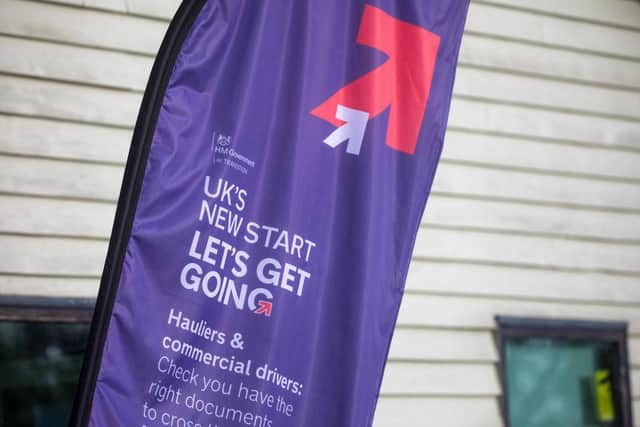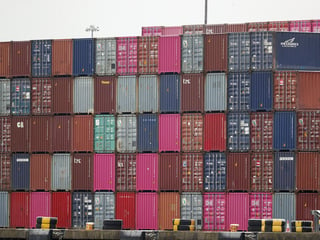How Scottish firms are eyeing new horizons in a post-Brexit landscape
While there is a push from some quarters north of the Border to rejoin the bloc, amid “sobering”claims that the agreement will leave Scotland worse off than before, for the time being its businesses are having, to various degrees, to adapt to the new terrain.
Yet there are also hopes that such repivoting will lay the foundations for new growth opportunities further down the line.
Advertisement
Hide AdAdvertisement
Hide AdOne firm to have taken significant action is Snag Tights, which in November announced the opening of a warehouse facility in the Netherlands – a move that chief executive Brie Read said had cost it at least £1 million.


The firm, which launched in 2018 and is now turning over £24m, said at the time that it made the move amid “little clarity” on UK e-commerce retailers’ future relationship with Europe, and to safeguard the firm’s future.
Snag manufactures its full product range – hosiery in a wide range of sizes – in Italy, before shipping to the UK where orders are fulfilled and then exported from its Livingston headquarters. But it has now switched all non-UK orders to the new warehouse in Venlo, which tripled its distribution capacity.
Ms Read said the firm decided more than a year ago to open up in Holland. Snag said when it announced the new facility that it was “forced to consider a future growth outside of Scotland, taking proactive steps to ensure it can continue trading in key markets across the globe”.


Ms Read said the process of setting up overseas was greatly supported by the Netherlands Foreign Investment Agency and proved “really easy” for the company, which fulfils around 21,000 orders a week, split equally between the UK, EU and the rest of the world.
What was more difficult, she found, was the prospect of taking away a lot of jobs from the UK. The business has more than 70 staff in Scotland and aims to have more than 100 in Venlo by the end of this year.
Ms Read said while she has had many stressful roles professionally, in the run-up to the Brexit deal being agreed, “I've never felt as stressed or as alone or as worried about the future as I [did then]”.
However, she said she believed Brexit would not restrict the growth of Snag. “I think it will definitely have impacted the margin that we're going to make,” she said. “And it's accelerated some of the decisions that we've had to make.
Advertisement
Hide AdAdvertisement
Hide Ad"But I think we're in a lucky position where Brexit won’t affect the ultimate demand for the business." However, Ms Read said she believed Brexit would affect how profitable it would be between now and the end of next year.
Another sector caught in Brexit’s crosshairs is Scotland’s whisky industry – which in 2019 saw exports total nearly £5 billion, according to the Scotch Whisky Association (SWA). The European Union comprised the largest region by value at nearly £1.5bn, with the USA the largest single destination country at £1.1bn – up 2.8 per cent from 2018.
One firm that works closely with the SWA is Gordon & MacPhail. David King, international sales director at the malt whisky specialist, said his own workload has grown by at least a tenth as a result of the UK leaving the EU, and the Elgin-headquartered firm decided to plan for the worst and hope for the best, “because that’s about all we [could] do".
The firm produced well ahead of schedule, bringing goods in and filling warehouses with products, and now has to put separate labels on for each individual EU nation, rather than just one. The EU represents about a third of Gordon & MacPhail's business by volume.
The fourth-generation family business last month unveiled its 2019 results, with Brexit uncertainty cited as among “global and domestic headwinds” seeing some evaporation of sales.
But it also stressed that it remained bullish over its capacity for growth and is investing for the future, including the development of its second Scotch whisky distillery, The Cairn.
Mr King also pointed to the changing geographical sands of the Scotch whisky market, with the EU retreating as the world's wealth heads south and east.
Encouragement
When he thinks of succession planning, and speaks to those that could guide the firm through its next stages, Mr King said: “I'm encouraging them to look at Asia, I'm encouraging them still to focus on North America, which is the largest spirits market in the world.”
Advertisement
Hide AdAdvertisement
Hide AdHe also said the industry previously perhaps took the European market for granted, with Brexit in fact causing bosses to question sources of growth. “I think we're in for a little bit of short-term irritation and it will force business to think differently, and to modify its markets, and where we can do trade,” he said. “There's a huge opportunity there.”
Looking at Scotland’s food and drink industry more broadly, news of a Brexit deal was welcomed in the immediate aftermath by James Withers. The boss of Scotland Food & Drink praised the fact that “crippling” tariffs of up to 80 per cent on some key food exports would be avoided.
But he expressed concern over the introduction of new export checks. “If [businesses] face more losses through no fault of their own, UK Government will have to be ready with financial aid,” he said.
That said, while challenges to businesses come and go, entrepreneurs determined to succeed will do what they can to adapt Darwin-style to survive.
Luke Davis, chief executive of private investment house IW Capital, said Britain “has always been a nation of shopkeepers, and the UK's community of small business owners and entrepreneurs will be key to our economic recovery in 2021”.
Thank you for reading this article. We're more reliant on your support than ever as the shift in consumer habits brought about by coronavirus impacts our advertisers.
If you haven't already, please consider supporting our trusted, fact-checked journalism by taking out a digital subscription.
Comments
Want to join the conversation? Please or to comment on this article.
